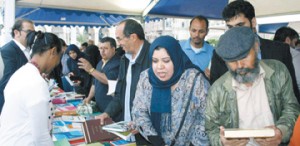
Flicking through an old book about Libyan history, Ashraf Hussein points to a picture of Tripoli’s main square in the 1920s.
“This is where we are standing now, Martyrs Square. Back then it was called Piazza Roma,” the 31-year old history masters student said, referring to Libya’s Italian colonial days.
“Such books were forbidden before because they told the true history of Libya “ Qaddafi did not want that. I bought many such books today.”
Hussein was one of the hundreds of Libyans who descended on the capital’s Martyrs Square last month to browse through thousands of books in Tripoli’s first major second hand book sale after the 2011 war that ousted Qaddafi.
With live traditional music in the background, the crowd huddled around tables, perused and bought books about history, philosophy, geography, poetry, cooking, martial arts and novels.
Organizers of the three-day fair, who will use the funds to build a mobile library that will visit schools, said Western books sold out first on the first day “ namely the “Harry Potter” collection.
“The number of visitors exceeded expectations and there were less and less books,” said 25-year old Rami Al-Shaheibi, who donated some books. “Now we know Libyans are eager for these books. Next time, we will try to provide more, especially English novels and those from other Western cultures.”
Under Qaddafi, Western books were banned under certain periods “ while those depicting heroes of the resistance movement against Italian colonialism and independence later were not given the attention they deserved, Libyans say.
“There is such a great variety of topics here; many of the topics were off limits before because they were against the regime’s ideologies,” state employee Salem Ayayd said. “Only later you could find such things on the Internet but that was not accessible to all.” Some 60 volunteers from civil society organizations such as the Al-Tanweer Movement that focuses on culture, organized the fair by putting up posters in neighborhoods and messages on Facebook.
“This is not about making money or doing business. We want to encourage reading, open people’s minds through books,” Nizar Abudayna, one of organizers, said. Some visitors beamed as they bought many books for less than 20 Libyan dinars ($ 15). “There is a saying ‘When you buy books, you buy happiness,” Suleiman Mansour, another organizer of the sale, said. “Right now, my happiness is indescribable as I look at all the people buying books.” Among the books on sale, there were some publications by authors affiliated with the former regime, which irritated some visitors. “Some people may be annoyed but every book should be given a chance to be put on display,” organizer Abudayna said.
AUTHOR: Islamic Voice
Islamic Voice is a monthly Islamic magazine published in Bangalore. It is the largest English language Muslim publication in India. It is a comprehensive magazine, places a relatively high emphasis on social issues and strives to have a broad appeal. Since 1987, Islamic Voice has covered its fascinating namesake without fear or favour, with insight, accuracy, thoroughness and a well rounded perspective on a variety of subjects - be it the economy, politics, lifestyle, the arts, entertainment, travel, science, technology or health. That's why Islamic Voice is the country's most widely read publication, a position it has held for more than a decade. And that's why it makes sense to subscribe to Islamic Voice.
We represents all Muslim sects and shades of thought from all over India. We focus on "our" triumphs which, mostly, go unreported as well as constructively addresses our failures and shortcomings.
Editor-in-Chief: A.W. Sadatullah Khan
Genre: Current Affairs associated with Muslims
Subjects Covered:
Human Rights I Analysis I Special Reports I Issues I Book Reviews I National I International I Newsmakers I Community News I Islamic Perspectives I Classifieds I Opinions
Focus articles on:
Education and Children I Inter-faith Relations I Matrimony I Muslim economy I Muslim Perspective I The Muslim world I Society I Travel I The Western viewpoint I Women in Islam
Special focus on Faith and Law:
Fiqh I Hadith I Quran

COMMENTS